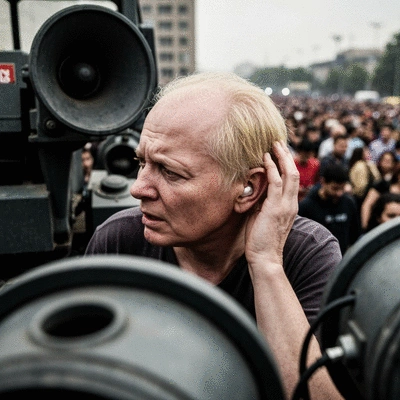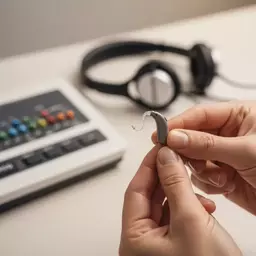Did you know that recognizing the early signs of hearing loss can significantly enhance your quality of life? Understanding these indicators is essential for taking proactive steps towards better hearing health. Let’s explore the crucial signs and insights that can empower you on your journey.
What You Will Learn
- Tinnitus, often marked by ringing or buzzing, can indicate underlying hearing issues.
- Struggling to understand speech in noisy environments is a common sign of potential hearing loss.
- Frequently asking others to repeat themselves might suggest a decline in hearing ability.
- Adjusting the volume on devices can be a clue that your hearing needs evaluation.
- Muffled hearing can point to significant hearing loss requiring immediate attention.
- Communication difficulties can strain relationships, making it crucial to seek help.
- Aging, loud noise exposure, and family history are key factors influencing hearing health.
- Early detection of hearing loss can prevent complications in mental health and cognitive function.
- Regular audiometric evaluations provide insights that can lead to effective treatment options.
- Engaging with a professional audiologist is essential for tailored hearing health management.
Understanding Hearing Health: Symptoms, Causes, and Solutions
This visual summarizes key aspects of hearing health, including common symptoms, underlying causes, and proactive steps for prevention and treatment, as discussed in the article. For more strategies on managing your auditory well-being, explore simple shifts for better hearing.
Common Symptoms of Hearing Loss
- Tinnitus (ringing in ears)
- Difficulty in noisy environments
- Frequently asking for repetition
- Adjusting device volume levels
- Muffled hearing sensation
Key Causes & Risk Factors
- Impact of aging
- Loud noise exposure
- Family history/genetics
- Environmental sound effects
- Link to balance issues
Benefits of Early Detection
- Preserves relationships
- Reduces mental health risks
- Mitigates cognitive decline
- More effective treatment options
- Improved quality of life
Proactive Steps & Treatment
- Regular hearing tests
- Use hearing protection
- Audiological consultations
- Hearing aids/Cochlear implants
- Tele-audiology options
Recognizing the Important Signs You May Need a Hearing Test
Navigating the world of hearing loss can sometimes feel like an uphill battle. Have you noticed any changes in how you hear those around you? Identifying the key signs that indicate you may need a hearing test is the first step towards maintaining your hearing health and ensuring you stay connected with your loved ones. Let’s explore some common symptoms together!
Identifying Common Symptoms of Hearing Loss
Hearing loss can manifest in various ways, and being aware of these symptoms is crucial. Here are some signs to look out for:
- Tinnitus: Understanding the Ringing in Your Ears
- Difficulty Understanding Speech in Noisy Environments
- Frequently Asking People to Repeat Themselves
- Adjusting Volume Levels on Devices
- Muffled Hearing: What It Indicates
- Communication Difficulties: When to Seek Help
Tinnitus: Understanding the Ringing in Your Ears
Tinnitus, often described as a ringing or buzzing sound in the ears, can be an early indicator of hearing issues. It’s important to note that tinnitus can be a sign of underlying hearing loss. If you experience this symptom regularly, it might be time to consult a professional.
Difficulty Understanding Speech in Noisy Environments
Do you find yourself straining to follow conversations in busy settings, like restaurants or gatherings? This common struggle can signal hearing loss. Many people report feeling overwhelmed by background noise, making it tough to focus on the person speaking. Recognizing this is key to understanding your hearing health!
Frequently Asking People to Repeat Themselves
If you often find yourself asking friends and family to repeat their words, it may be a sign that your hearing is not as sharp as it once was. This can lead to feelings of frustration for both you and your loved ones. Remember, communication is crucial, and seeking help can improve this aspect of your life.
Adjusting Volume Levels on Devices
Are you constantly turning up the volume on your television or phone? If so, it could indicate that you’re struggling to hear at normal levels. Pay attention to your habits—frequently altering volume settings might be a signal that your hearing needs to be evaluated.
Muffled Hearing: What It Indicates
Feeling as though sounds are muted or muffled? This sensation can be troubling and often points to hearing loss. It’s vital to address this issue promptly, as it can hinder your ability to engage fully in life’s moments.
Communication Difficulties: When to Seek Help
Communication is the bridge that connects us to others, so if you find it difficult to engage in conversations, don’t hesitate to seek assistance. Reaching out for support can enrich your relationships and enhance your overall quality of life. For additional resources on managing communication challenges, consider exploring enhancing home communication with hearing loss.

Exploring Causes and Risk Factors of Hearing Loss
Understanding the causes of hearing loss is just as important as recognizing its symptoms. Here are some factors that can contribute to hearing impairment:
- Impact of Aging on Hearing Health
- Effects of Loud Noise Exposure on Auditory Function
- Understanding Family History of Hearing Loss
- Environmental Sounds and Their Effects on Hearing
Impact of Aging on Hearing Health
As we age, our bodies undergo various changes, including our hearing. It’s natural for hearing ability to decline over time. Regular check-ups can help you stay on top of your hearing health and identify any changes early on.
Effects of Loud Noise Exposure on Auditory Function
Have you ever attended a concert or worked in a loud environment? Prolonged exposure to loud noises can damage the hair cells in our ears, leading to permanent hearing loss. Taking precautions, like using ear protection, can make a significant difference!
Understanding Family History of Hearing Loss
If hearing loss runs in your family, your risk increases. It’s essential to share this information with your audiologist, as it may influence their recommendations for monitoring your hearing health.
Environmental Sounds and Their Effects on Hearing
Everyday sounds can take a toll on your ears over time. Traffic, loud appliances, and even music can contribute to hearing loss, especially without protection. Being aware of your auditory environment is vital for preserving your hearing.
The Importance of Early Detection in Hearing Health
Taking action early can have a profound impact on your hearing health. Let’s examine why recognizing signs and seeking help promptly is so important:
- How Untreated Hearing Loss Affects Relationships
- Understanding the Mental Health Implications
- Cognitive Decline Linked to Hearing Loss
- Benefits of Early Detection and Audiometric Evaluations
How Untreated Hearing Loss Affects Relationships
Untreated hearing loss can create distance in relationships with loved ones. Misunderstandings may lead to frustration and isolation. Staying connected with your family and friends is vital, and addressing your hearing is a significant step in that direction.
Understanding the Mental Health Implications
Hearing loss can also impact mental health, contributing to feelings of anxiety and depression. It’s essential to acknowledge these connections and seek help if you’re finding it hard to cope. You're not alone, and support is available.
Cognitive Decline Linked to Hearing Loss
Research has shown that untreated hearing loss can be linked to cognitive decline. Engaging in conversations and social interactions is crucial for keeping our minds sharp. Early action can help prevent these complications!
Benefits of Early Detection and Audiometric Evaluations
Regular audiometric evaluations can provide valuable insights into your hearing health. Early detection often leads to more effective treatment options, helping you maintain a high quality of life. Embrace the opportunity to understand your hearing better!
What to Expect During a Hearing Evaluation
Thinking about getting a hearing evaluation? Here’s what you can expect during your appointment:
- Overview of Common Procedures in a Hearing Test
- Interpreting Your Audiogram: A Simple Guide
- Questions to Ask Your Audiologist Before the Test
- The Role of Hearing Screenings in Your Hearing Journey
Overview of Common Procedures in a Hearing Test
During a hearing test, you’ll typically undergo several procedures, including a pure-tone test and speech recognition test. These tests help audiologists assess your hearing ability at various frequencies. Don’t worry—these tests are straightforward and designed to help you!
Interpreting Your Audiogram: A Simple Guide
Your audiogram is a visual representation of your hearing ability. It might look complicated at first, but your audiologist will help you understand what it means for your hearing health. Having this information is crucial for determining the best course of action moving forward.
Questions to Ask Your Audiologist Before the Test
Before your evaluation, it’s important to communicate openly with your audiologist. Here are some questions you might consider asking:
- What should I expect during the test?
- How long will the evaluation take?
- What are the next steps if hearing loss is detected?
The Role of Hearing Screenings in Your Hearing Journey
Hearing screenings are an essential part of maintaining your hearing health. These screenings can catch issues before they become significant problems. Regular check-ups can empower you to take control of your hearing journey!
The Role of Audiologists in Your Hearing Journey
Audiologists play a vital role in supporting individuals with hearing loss. Here’s how these professionals can help:
- How Audiologists Diagnose Hearing Issues
- Understanding the Importance of Professional Expertise in Audiology
- Audiological Consultation: What to Expect
How Audiologists Diagnose Hearing Issues
Audiologists utilize various tests and assessments to diagnose hearing issues accurately. Their expertise ensures that you receive a thorough evaluation tailored to your unique hearing needs.
Understanding the Importance of Professional Expertise in Audiology
Working with an experienced audiologist means you’ll be guided through the complexities of hearing loss with compassion and knowledge. Their professional insights can make a world of difference in your hearing journey!
Audiological Consultation: What to Expect
During your consultation, your audiologist will discuss your hearing history, perform tests, and develop a personalized plan for your hearing health. This collaborative approach is essential for achieving the best results!
Addressing Balance Disorders Related to Hearing Health
Did you know that hearing health is closely linked to balance? Let’s explore this important connection:
- Link Between Hearing Loss and Balance Issues
- Recognizing Vestibular Symptoms to Seek Help
- How Balance Disorders Affect Daily Life
Link Between Hearing Loss and Balance Issues
The inner ear plays a critical role in both hearing and balance. Changes in your hearing ability can lead to balance disorders, which can affect your daily activities. Being aware of this connection can help you seek the right support!
Recognizing Vestibular Symptoms to Seek Help
If you experience dizziness or unsteadiness, it’s important to talk to your audiologist. Vestibular symptoms can indicate underlying issues that need attention, and early intervention is key.
How Balance Disorders Affect Daily Life
Struggling with balance can significantly impact your quality of life. It can make simple tasks challenging and create fear of falling. Addressing these concerns with a professional can help restore your confidence and safety.
Practical Tips for Preventing Hearing Loss
Prevention is always better than cure! Here are some practical habits you can adopt to protect your hearing:
- Everyday Habits to Protect Your Ears
- When to Use Hearing Protection Devices
- Understanding Hearing Conservation Strategies
Everyday Habits to Protect Your Ears
Simple habits like keeping the volume low on your devices and taking breaks from noisy environments can protect your ears. Remember, small changes can lead to big differences in your hearing health!
When to Use Hearing Protection Devices
If you’re exposed to loud sounds regularly, consider using earplugs or noise-canceling headphones. Protecting your ears from excessive noise can significantly reduce your risk of hearing loss.
Understanding Hearing Conservation Strategies
Implementing hearing conservation strategies, especially in noisy workplaces, is crucial. These strategies can include regular hearing screenings and awareness training, ensuring you stay informed and proactive about your hearing health.
Pro Tip
Did you know? Regularly monitoring your hearing health not only helps catch issues early but also empowers you to make informed decisions about your auditory care. Make it a habit to schedule yearly hearing evaluations, especially if you notice any changes in your hearing ability!
Taking Action: Why You Shouldn't Delay a Hearing Test
Taking the step to get a hearing test can feel daunting, but it's crucial for your well-being. At HearWise Living, I understand that many people hesitate to schedule these evaluations due to concerns about costs or what the results might indicate. However, delaying a hearing test can lead to further complications down the road, impacting not just your hearing but also your quality of life. Let’s explore why it's important to act now!
Understanding Costs and Insurance Coverage for Hearing Tests
One of the primary concerns many have is the expense associated with hearing tests. It’s essential to know that hearing tests are often more affordable than you might think, and in many cases, they can be covered by insurance. Here’s what you need to know about the costs:
- Average Costs: A typical hearing test can range from $50 to $250, depending on the facility and location.
- Additional Fees: Some tests might incur extra charges for comprehensive evaluations or follow-up visits.
- Free Screenings: Many audiology clinics, including ours at HearWise Living, offer free or discounted hearing screenings as part of community outreach programs.
Being informed about these costs can alleviate some fears and encourage you to prioritize your hearing health. Additionally, it's important to check with your insurance provider to see what coverage options are available for audiology services.
Insurance Coverage Options for Audiology Services
Understanding how insurance can assist with hearing care is vital. Many plans cover hearing tests, which can significantly lessen your out-of-pocket expenses. Here are some options to consider:
- Medicare typically covers the diagnostic portion of hearing exams.
- Private insurance plans often include coverage for hearing tests and follow-up care.
- Some state programs provide financial assistance for individuals in need of hearing care.
Before your appointment, I encourage you to contact your insurer to clarify your specific benefits. This way, you can focus on getting the help you need without financial worry!
Next Steps After Your Hearing Evaluation
Once you’ve taken the first step and had your hearing evaluated, it’s essential to understand the next steps. This evaluation will provide you with valuable insights into your hearing health, and knowing what to expect can help ease any anxiety.
Interpreting Your Results: What They Mean for You
After your hearing test, you'll receive an audiogram that outlines your hearing abilities. Interpreting these results is crucial for making informed decisions about your hearing health. Look for:
- Frequency Levels: Each frequency indicates how well you hear specific sounds.
- Type of Hearing Loss: Understanding whether it’s conductive, sensorineural, or mixed can help in treatment decisions.
- Recommendations: Your audiologist will provide guidance based on your results, which may include further testing or treatment options.
Don’t hesitate to ask questions during this process! Your audiologist is there to support you and clarify any uncertainties you might have.
Options for Treatment and Management of Hearing Loss
Based on your evaluation, there are several options available for managing hearing loss. Here are some common treatments:
- Hearing Aids: These devices amplify sounds and can be customized to your specific needs.
- Cochlear Implants: For those with profound hearing loss, implants can provide a sense of sound.
- Assistive Listening Devices: These can help in specific situations, such as using a TV listener or a personal FM system.
Choosing the right treatment is a personal decision, and I recommend discussing these options thoroughly with your audiologist. They can help you weigh the benefits and decide what fits best for your lifestyle.
The Role of Hearing Aids and Cochlear Implants in Rehabilitation
Hearing aids and cochlear implants play a significant role in improving hearing abilities and overall quality of life. Here’s how:
- Hearing aids provide a natural listening experience, allowing users to engage in conversations and enjoy sounds in everyday life.
- Cochlear implants bypass damaged parts of the ear, directly stimulating the auditory nerve, which can lead to improved hearing for those who are unable to benefit from hearing aids.
- Both options often come with personalized fitting and adjustments to ensure maximum effectiveness.
At HearWise Living, I believe in the power of technology to enhance communication and connections. Finding the right device can change your life!

Encouraging Early Action: Don’t Wait to Seek Help
Taking the initiative to seek help for hearing loss is one of the best gifts you can give yourself. The sooner you act, the better your chances of maintaining strong communication and connections with loved ones.
The Benefits of Proactive Hearing Health Management
Proactive management of hearing health can lead to numerous benefits, including:
- Enhanced communication abilities, allowing for deeper connections with family and friends.
- Improved mental health, reducing feelings of isolation often associated with hearing loss.
- Better overall quality of life, enabling you to engage fully in social activities and hobbies.
Remember, being proactive means staying engaged and informed about your hearing health. Don’t wait for issues to escalate—seek help early!
Where to Find Reliable Audiology Services Near You
Finding reliable audiology services is easier than you think! Here are some tips to help you locate a trusted audiologist:
- Ask for recommendations from your primary care physician or friends who have experience with audiologists.
- Check online reviews and ratings for local audiology clinics.
- Look for audiologists who are certified and have a good reputation within your community.
At HearWise Living, I am committed to providing the resources you need to navigate your hearing health journey with confidence!
Exploring Tele-audiology as a Convenient Option
In today’s digital world, tele-audiology is becoming a popular and convenient option for many. This service allows you to consult with audiologists remotely, which can save time and provide flexibility. Here are some benefits:
- Access to specialists regardless of your location.
- Convenience of scheduling appointments that fit into your busy life.
- Ability to have follow-up consultations from the comfort of your home.
Tele-audiology is a great way to stay proactive about your hearing health, especially if in-person visits are challenging! For more information on finding local support, check out finding local audiology services.
Recap of Key Points
Here is a quick recap of the important points discussed in the article:
- Recognize common symptoms of hearing loss, such as tinnitus, difficulty understanding speech in noisy environments, and frequently asking others to repeat themselves.
- Understand the impact of aging, loud noise exposure, and family history on hearing health.
- Early detection of hearing loss can lead to better communication, improved mental health, and overall quality of life.
- Consult audiologists for accurate diagnosis and personalized treatment plans.
- Adopt preventive habits, such as using hearing protection and maintaining volume levels on devices, to safeguard your hearing health.
- Explore the affordability of hearing tests and insurance coverage options available to you.
Frequently Asked Questions (FAQs)
What are the common signs of hearing loss?
Common signs of hearing loss include tinnitus (ringing in the ears), difficulty understanding speech in noisy environments, frequently asking others to repeat themselves, constantly adjusting device volume, and experiencing muffled hearing.
What causes hearing loss?
Hearing loss can be caused by various factors such as aging, prolonged exposure to loud noise, genetic predisposition (family history), and the cumulative effects of everyday environmental sounds.
Why is early detection of hearing loss important?
Early detection is crucial because it can prevent complications such as communication difficulties, strained relationships, mental health issues (like anxiety and depression), and potential links to cognitive decline. Early intervention generally leads to more effective treatment options and an improved quality of life.
What should I expect during a hearing test?
During a hearing test, you can expect common procedures like pure-tone tests and speech recognition tests, which help audiologists assess your hearing at different frequencies. Your audiologist will also interpret your audiogram and discuss next steps.
Are hearing tests covered by insurance?
Many insurance plans, including Medicare, often cover the diagnostic portion of hearing exams. Private insurance plans frequently include coverage for hearing tests and follow-up care. It is recommended to check with your specific insurance provider for details on coverage options.
How can I protect my hearing?
You can protect your hearing by adopting everyday habits such as keeping device volumes low, taking breaks from noisy environments, and using hearing protection devices (like earplugs or noise-canceling headphones) when exposed to loud sounds. Implementing hearing conservation strategies, especially in noisy workplaces, is also beneficial.










